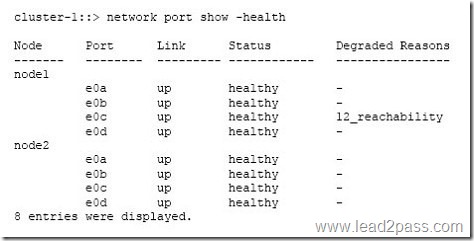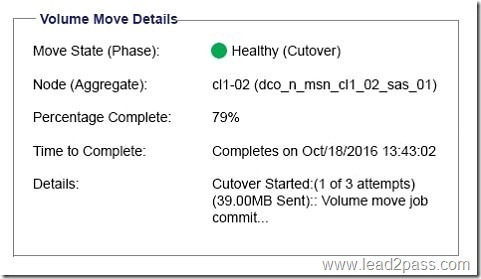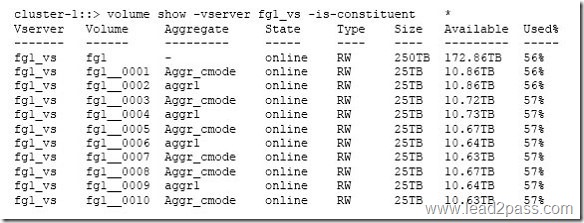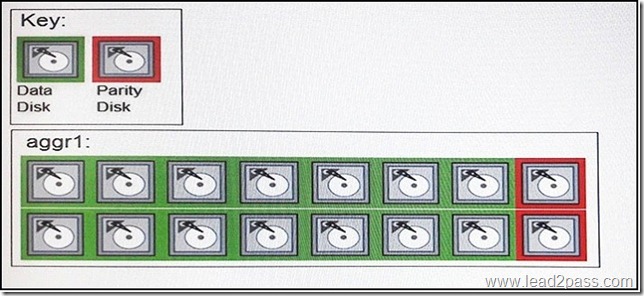Lead2pass Offers Free NS0-158 Dumps Files for Free Downloading By NS0-158 Exam Expert:
https://www.lead2pass.com/ns0-158.html
QUESTION 11
Which two features provide physical path resiliency from a Windows 2016 server to an iSCSI LUN on a 12-node ONTAP cluster? (Choose two.)
A. broadcast domains
B. MPIO
C. failover groups
D. ALUA
Answer: BD
Explanation:
Microsoft Multipath I/O (MPIO) is a Microsoft-provided framework that allows storage providers to develop multipath solutions that contain the hardware-specific information needed to optimize connectivity with their storage arrays. These modules are called device- specific modules (DSMs). The concepts around DSMs are discussed later in this document.
MPIO is protocol-independent and can be used with Fibre Channel, Internet SCSI (iSCSI), and Serial Attached SCSI (SAS) interfaces in Windows Server.
Asymmetric Logical Unit Access (ALUA), also known as Target Port Groups Support (TPGS), is a set of SCSI concepts and commands that define path prioritization for SCSI devices.
https://kb.netapp.com/support/s/article/ka21A0000000d32QAA/asymmetric-logical-unit-access-alua-support-on-netapp-storage-frequently-asked-questions?language=en_US
QUESTION 12
Click the exhibit button.
Referring to the exhibit, which statement about the volume move process is true?
A. Client access to the volume is blocked during this phase of operation.
B. The initial replication phase sent 39 MB from the source to the destination location.
C. Client access is being redirected to the destination location during this phase of the operation.
D. The cutover process failed and is in a holding pattern before being attempted again.
Answer: B
QUESTION 13
Click the Exhibit button. While reviewing the port health shown in the exhibit, you notice that port e0c on node1 is degraded.
What would cause this problem?
A. The port is not plugged into a switch.
B. The port is in the wrong broadcast domain.
C. The port does not have an IP address.
D. The port has been flapping.
Answer: B
Explanation:
L2 reachability health monitor: Monitors whether all ports configured in the same broadcast domain have L2 reachability to each other.
This health monitor reports L2 reachability issues in all IPspaces; however, it marks only the ports in the cluster IPspace as degraded.
QUESTION 14
You have a read-only volume that needs protection within the cluster, but you do not have a SnapMirror license.
Which mirror type would you use to protect the volume?
A. DP
B. LS
C. TDP
D. XDP
Answer: B
Explanation:
A load-sharing mirror reduces the network traffic to a FlexVol volume by providing additional read-only access to clients.
You can create and manage load-sharing mirrors to distribute read-only traffic away from a FlexVol volume.
https://library.netapp.com/ecmdocs/ECMP1368017/html/GUID-4931A901-D6D0-458B-8D3A-A92427FDD8B8.html
QUESTION 15
Click the exhibit button.
Referring to the exhibit, you have a FlexGroup volume that is 250 TB with 10 constituents.
You apply the volume modify -vserver fg1_vs -volume fg1 -size 350TB command.
What affect does the command have on the FlexGroup volume and its constituents?
A. It grows the FlexGroup volume to 600 TB by adding 14 new constituents.
B. It grows the FlexGroup volume to 350 TB by adding four new constituents
C. It grows the FlexGroup volume to 350 TB by increasing the size of each constituent to 35 TB.
D. It grows the FlexGroup volume to 600 TB by increasing the size of each constituent to 60 TB.
Answer: C
Explanation:
If you want to add more space, you can increase the FlexGroup volume collective size. Increasing the size of the FlexGroup volume resizes the existing constituents of the FlexGroup.
If you want to increase the capacity by resizing the existing constituents then use the command:
volume modify -vserver vserver_name -volume fg_name -size new_size
http://docs.netapp.com/ontap-9/index.jsp?topic=%2Fcom.netapp.doc.pow-fg-mgmt%2FGUID-79766621-ECFF-4A1A-A218-197BB73E985B.html
QUESTION 16
A customer has created an SVM in an 8-node cluster with only FC licensed on all nodes.
The customer wants to limit the number of paths visible to each host.
Which three technologies accomplish this task? (Choose three.)
A. virtual SANs (VSANs) for all FC target ports to segment specific virtual ports in mapping to the application servers
B. SLM to limit the paths from each node to the appropriate application servers
C. FC switch zoning of a subset of the target ports to each application server’s HBAs
D. port sets to limit the paths from each node to the appropriate application servers
E. multipathing to limit the access to the LUNs from each host
Answer: BCD
Explanation:
You can use FC switch zoning, portsets, and Selective LUN Map (SLM) to limit the number of paths between hosts and LUNs in configurations with multiple target ports connected to the same fabric.
https://library.netapp.com/ecm/ecm_download_file/ECMP1636036, page 20
QUESTION 17
Click the Exhibit button.
You are receiving reports of high storage latency from the database administrators. The NetApp storage system is connected to the network using 10 Gb.
You run the sysstat command as shown in the exhibit.
In this scenario, why is storage latency high?
A. The system does not have enough cache.
B. The system is experiencing a disk bottleneck.
C. The CPU usage is too high.
D. The network interfaces are maximized out.
Answer: B
QUESTION 18
Click the Exhibit button. The size of the aggr1 RAID group shown in the exhibit is 8.
What is the RAID type?
A. RAID-TEC
B. RAID-DP
C. RAID4
D. RAID0
Answer: B
QUESTION 19
Which CLI command is used to move epsilon to a new node?
A. cluster modify
B. cluster identity modify
C. cluster setup
D. storage failover takeover
Answer: A
Explanation:
Reassigning epsilon to another node in the cluster. Only one node in the cluster can hold epsilon. Epsilon gives the holding node an extra fractional voting weight in the quorum.
https://library.netapp.com/ecmdocs/ECMP1196798/html/GUID-5FAA5445-0872-400B-B7AD-B27CEE3D770A.html
QUESTION 20
You have a FlexVol volume with LUNs and need to set policies to prevent an ENOSPC error on the host.
In this scenario, which two commands will keep the LUN available to the host? (Choose two.)
A. volume autosize
B. snapshot autodelete
C. snapshot delete
D. volume size
Answer: BC
Explanation:
ENOSPC is a UNIX operating system error that sometimes returns the message Not enough space is available to service your request.” The error message occurs because of a shortage of file system space or lack of available media blocks.
You can delete Snapshot copies manually, or automatically by enabling the Snapshot autodelete capability for the volume.
Define and enable a policy for automatically deleting Snapshot copies by using the volume snapshot autodelete modify command.
You can use the snap delete command to delete a Snapshot copy before the preset interval to free disk space or because it is a manual Snapshot copy that is no longer needed but is not going to be automatically deleted.
Note: We get ENOSPC errors because Data ONTAP lets the Snapshot copy grow into the volume space. Every write in WAFL is a write to a new block. If an old block is part of a Snapshot copy, Data ONTAP needs to preserve the old block and the new changed block. This is not a problem specific to NetApp. Every storage vendor who supports a snapshot feature has to deal with it. There are two options when there is no space to accommodate the Snapshot copies:
https://community.netapp.com/fukiw75442/attachments/fukiw75442/backup-and-restore-discussions/5980/1/tr-3633.pdf
NS0-158 dumps full version (PDF&VCE): https://www.lead2pass.com/ns0-158.html
Large amount of free NS0-158 exam questions on Google Drive: https://drive.google.com/open?id=0B3Syig5i8gpDSlNsODFqU2FNSEk



